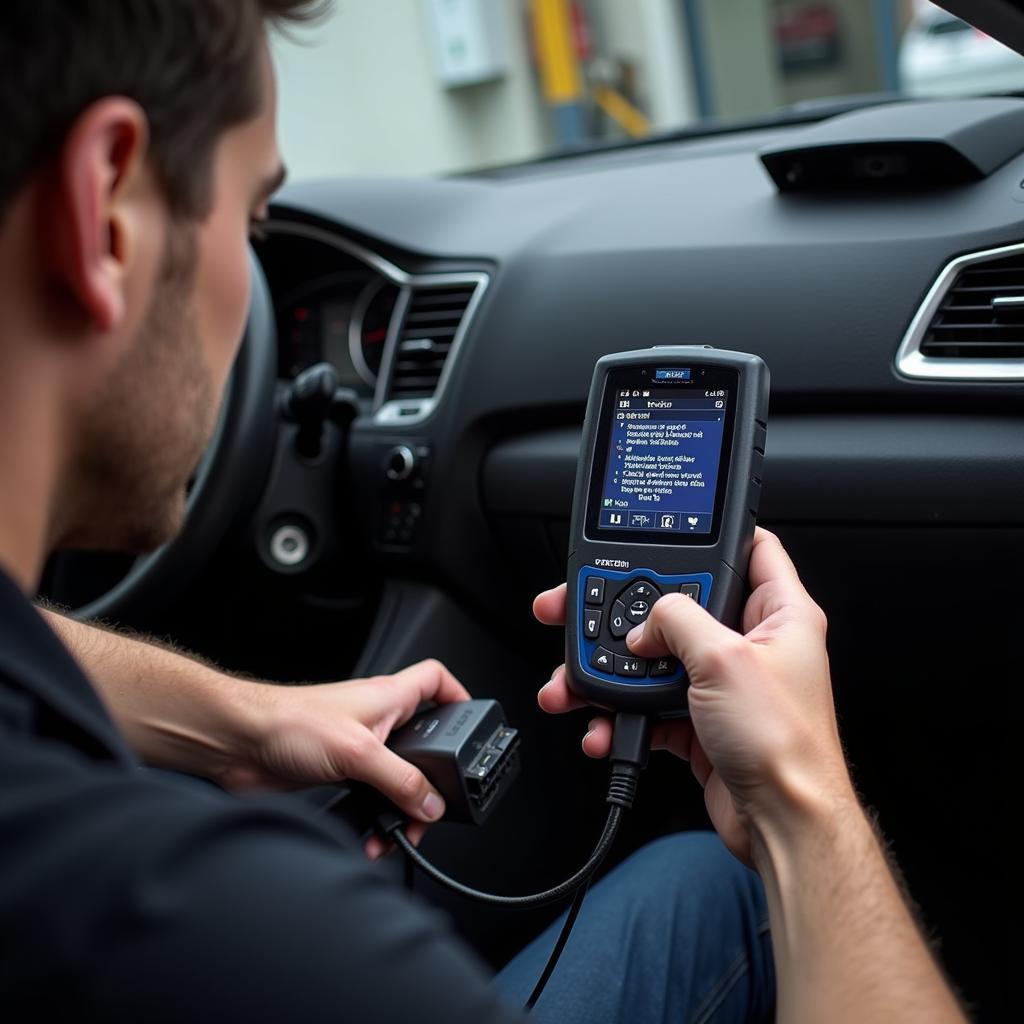Ensuring your vehicle’s safety and performance relies heavily on regular inspections. Understanding the tools necessary to make a car inspection empowers you to perform basic checks yourself or know what to expect when taking your car to a professional. This guide covers the essential tools for a thorough car inspection, ranging from simple handheld devices to more complex diagnostic equipment.
Basic Tools for a Visual Inspection
Even without specialized equipment, a visual inspection can reveal a lot about your car’s condition. Here are some essential tools for a preliminary check:
- Flashlight: A bright flashlight is crucial for inspecting dark areas like the engine bay, undercarriage, and inside the wheel wells. It helps identify leaks, rust, and other potential issues.
- Gloves: Protect your hands from grease and grime with a pair of durable gloves. Nitrile gloves are a good choice due to their resistance to chemicals and oils.
- Mirror: A small mirror on an extendable handle allows you to see hard-to-reach areas like the underside of the engine or the back of components.
- Tire Pressure Gauge: Maintaining correct tire pressure is vital for safety and fuel efficiency. A reliable tire pressure gauge is a must-have.
Tools for a Deeper Dive
For a more comprehensive inspection, the following tools are invaluable:
- OBD-II Scanner: An OBD-II (On-Board Diagnostics) scanner is a powerful tool that plugs into your car’s diagnostic port. It can retrieve diagnostic trouble codes (DTCs), providing insights into the car’s electronic systems.
- Multimeter: A multimeter measures voltage, current, and resistance, allowing you to diagnose electrical issues like faulty sensors, wiring problems, or battery issues.
- Stethoscope: A mechanic’s stethoscope can pinpoint the source of unusual noises coming from the engine, transmission, or other moving parts.
- Compression Tester: This tool measures the compression pressure in each cylinder, revealing potential problems with piston rings, valves, or head gaskets.
 Mechanic Using OBD2 Scanner for Car Diagnostics
Mechanic Using OBD2 Scanner for Car Diagnostics
Advanced Diagnostic Equipment for Professionals
While the tools mentioned above are sufficient for many DIY inspections, professional mechanics utilize more advanced equipment like:
- Oscilloscope: An oscilloscope allows mechanics to visualize electrical signals, providing detailed information about sensor performance and circuit behavior.
- Emissions Analyzer: This tool measures the levels of pollutants in a car’s exhaust, ensuring compliance with environmental regulations.
- Vehicle Lift: A vehicle lift provides easy access to the underside of the car for a thorough inspection of the suspension, brakes, and exhaust system.
Why Regular Car Inspections Matter
Regular inspections are crucial for several reasons:
- Safety: Identifying potential problems early can prevent accidents and ensure your car is roadworthy.
- Performance: Addressing minor issues can improve fuel economy and maintain optimal vehicle performance.
- Resale Value: A well-maintained car with a documented service history commands a higher resale value.
Conclusion
Knowing the tools necessary to make a car inspection is an important step towards responsible car ownership. Whether you choose to perform some basic checks yourself or rely on a professional mechanic, regular inspections are essential for maintaining your vehicle’s safety, performance, and longevity. Don’t neglect your car’s health – regular inspections using the right tools will pay off in the long run.
FAQ
- How often should I inspect my car?
- What is an OBD-II scanner, and how does it work?
- Can I perform a car inspection myself?
- What are the most common problems found during a car inspection?
- How much does a professional car inspection cost?
- What should I do if my car fails an inspection?
- What are some signs that my car needs an inspection?
When you need support, contact us via WhatsApp: +1(641)206-8880, Email: [email protected], or visit us at 910 Cedar Lane, Chicago, IL 60605, USA. Our customer service team is available 24/7.
